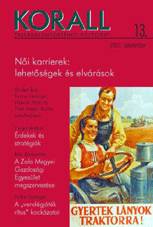„Gyertek lányok traktorra!” Női traktorosok a gépállomáson és a propagandában
„Girls, Mount the Tractor!” Woman Tractor Drivers at the Machine Station and in Propaganda
Author(s): Gyöngyi FarkasSubject(s): History
Published by: KORALL Társadalomtörténeti Egyesület
Keywords: social history; Hungary; 1950’s; agriculture; rural society; collectivization; women’s roles; women’s labour; women’s emancipation; women and manual labour
Summary/Abstract: In the beginning of the period of extensive industrialization in Hungary (1949–1953), there was a powerful campaign launched for the recruitment of women as tractor drivers. Leaning on the increased labour-demand in industry and an exaggerated idea of gender equality as arguments, women were demanded in huge numbers in almost all professions, even in those, which were earlier only practiced by men. Behind the goal to set women on the tractor board was not only the motivation to mechanically copy the Soviet pattern but also the contemporary idea to base agriculture primarily on women – while men were rushing into industry. Being a tractor driver, which counted as heavy physical work, did not become a popular profession among women. The propaganda-produced favourable image of the woman tractor driver did not compensate for the lack of real attraction and true interest. The number of women working with tractors did not come near to the extent planned by those on power (50%), even at the peak of the campaign it reached only 8%. At the same time, with the figure of the tractorist girl wrapped in contemporary ideology, propaganda has created the most successful symbol of the era. Almost all tractorist girls came from that poor peasant layer of society that was accustomed to woman labour from earlier on. Probably, the machine station was only a short stop for them that they chose on propaganda’s influence and that they, seeing the difficulties, left for other jobs offered in great numbers by extensive industrialization (building operations, factories etc.).
Journal: Korall - Társadalomtörténeti folyóirat
- Issue Year: 2003
- Issue No: 13
- Page Range: 65-86
- Page Count: 22
- Language: Hungarian

